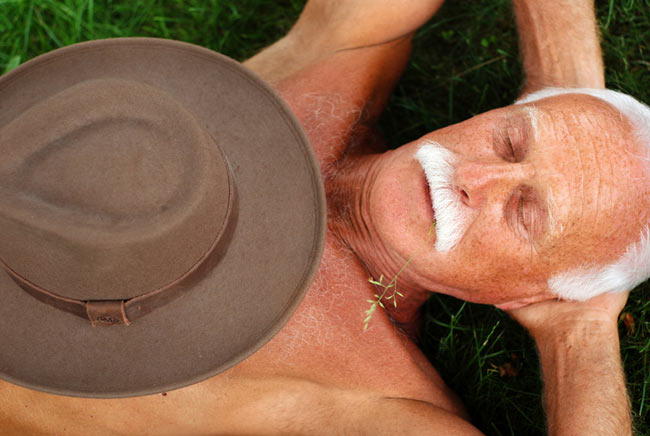Elderly Don’t Need As Much Sleep, Study Finds

Old people are known to be lousy sleepers, but a new study suggests it might all be in their heads, at least for many of them.
Medications, poor health, bad bedtime habits (such as watching a movie or drinking coffee or booze), circadian rhythms, and too much or too little in their personal "sleep bank" have all taken the blame for seniors' common complaints of insomnia.
Elizabeth Klerman of Brigham and Women's Hospital and the Harvard Medical School set out to clear it up once and for all with a controlled study of 18 subjects ages 60 to 76 and 35 younger subjects, ages 18 to 32, all healthy and not on medication that might affect sleep. Even people who had crossed more than one time zone in the past 3 months were disqualified, as well as those who had worked night or rotating shifts in the past three years.
After monitoring their sleep at home, the subjects were regularly instructed to lie quietly with their eyes closed and to try to sleep, for as much as 16 hours daily for several days in a row. They had all the time in the world.
The bottom line was that the seniors simply needed less sleep — about 1.5 hours less.
Circadian rhythms and preferences
The results are detailed online in the July 24 issue of the journal Current Biology. Younger subjects slept for an average of 9 hours compared to 7.5 for older people, said Klerman and her colleague Derk-Jan Dijk of the Surrey Sleep Research Centre in England.
Get the world’s most fascinating discoveries delivered straight to your inbox.
The age-related decline in sleep included an even split between rapid eye movement (REM) sleep, associated with dreaming, and non-REM sleep, Klerman said.
Klerman and Dijk kept subjects in conditions that controlled for circadian rhythms by allowing the chance to sleep during both the night and the day and by controlling individual choices in sleep opportunities.
While humans sometimes cannot sleep when tired, there is no evidence that they can sleep when they are not tired, Klerman explained.
Insomnia and expectations
The results have implications for seniors who think they have insomnia.
"There are definitely older people with insomnia," Klerman told LiveScience. "However there may also be some older people who 'create' insomnia if they believe that they 'need' 8 to 9 hours of sleep and therefore spend more time in bed (lying awake) than needed to achieve the amount of sleep 'needed.'"
"It's also possible that they sleep less even when given the opportunity for more sleep because of age-related changes in the ability to fall asleep and remain asleep," she added, noting that the new results apply only to healthy individuals taking no medication and having no medical conditions or sleep disorders.
The study also found that most healthy people, and young people in particular, don't get as much sleep as they need.
Given the evidence that insufficient sleep is associated with increased risk of accidents, errors, decreased learning and immune function, and metabolic changes similar to diabetes, Klerman encouraged younger people to sleep more than they currently do.
Ages of sleep
The idea that our sleep habits change markedly across the life span isn't new.
The same study found another age effect: Given the same amount of time in bed, older people take longer to fall asleep.
The researchers set 60 years old as the starting point for their older subjects to ensure a clear distinction from the younger group, but it is possible that the declining capacity to sleep could reach back into the middle-age years too, Klerman said.
"My expectation is that the change is gradual and there is no time point at which we 'age,'" she said. "Sleep changes from infancy, through childhood, puberty, young adulthood and middle-age until we die."
Needless medications?
The findings may also influence treatment for insomnia in older people and provoke novel approaches, such as exercise, new pharmaceuticals or ocular light therapy, Klerman said.
"If older people believe that they need more sleep than they can achieve even when they spend extra time in bed, then they may complain of insomnia: being awake when wanting to be asleep. They may start using medications needlessly," Klerman said.
However, if seniors are tired during the day, they should consider an evaluation for a sleep disorder that may be interfering with their ability to obtain good sleep at night.
The research was funded by the National Institutes of Health. Dijk is supported by the Biotechnology and Biological Sciences Research Council of the United Kingdom and Wellcome Trust.
- Video: Why We Age
- Top 10 Mysteries of the Mind
- 10 Things You Need to Know About Coffee
Robin Lloyd was a senior editor at Space.com and Live Science from 2007 to 2009. She holds a B.A. degree in sociology from Smith College and a Ph.D. and M.A. degree in sociology from the University of California at Santa Barbara. She is currently a freelance science writer based in New York City and a contributing editor at Scientific American, as well as an adjunct professor at New York University's Science, Health and Environmental Reporting Program.
 Live Science Plus
Live Science Plus






